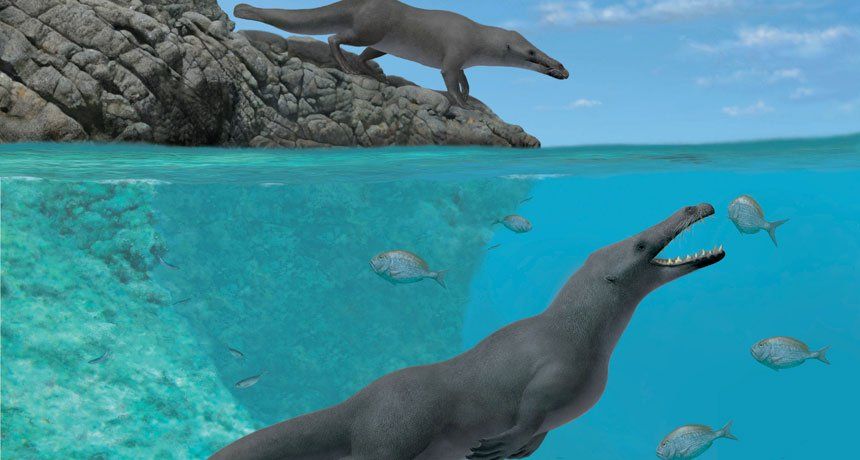Four-legged whale that roamed the land found in South America.
Four-legged whale that roamed the land found in South America.
JANE SHEEHAN | 22nd January 2020.
The cetaceans we are familiar with today, i.e. whales, dolphins and porpoises, are all obligate aquatic species - meaning they spend their entire lives under the sea. These familiar modern-day species all originated from small quadrupedal ariodactyls. Presence of quadrupedal species of whale have been found in Egypt, Togo and the Western Sahara while a recently discovered specimen is the oldest whale from the Pacific Ocean.
Though previous discoveries have enlightened us to the existence quadrupedal species, a recent study on the excavation of a fossil in Peru has driven the first indisputable evidence of a whale species adapted for both terrestrial and aquatic environments (Lambert et al ., 2019). The 43 million-year-old Eocene fossil of Peregocetus pacificus was unearthed by a team of palaeontologists in the Yumaque Formation of the Pisco Basin, approximately 1km from Playa Media Luna on the western coast of Peru. This skeleton is the most complete non-pelagicate cetacean outside of Indo-Pakistan, and maybe the oldest quadrupedal species to date excavated in the Western Hemisphere.
In the past, these Eocene specimens have confirmed early whale species as amphibious and coastal dwelling however due to incompleteness of skeletal remains scientists have been unable to confirm the extent of swimming and walking ability. Species of early whale such as Rodhocetus and Maiacetus were found to have had vestigial hind limbs, which helped propel these species within the water columns. As these species evolved, these hind limb developed into the flippers seen on modern day cetaceans (Interestingly, a small percentage of modern-day cetaceans are born with rare vestiges of hind limbs). The completeness of the P. pacificus specimen finally sheds light on the transition from land to sea as it is the first indisputable fossil record.
Remains of Peregocetus show that the ancient whale was 13 foot-long, had four legs, webbed feet and a tail. The vertebrae present suggest a powerful tail, not as prevalent in other documented records, similar to other semi-aquatic mammals, such as modern-day sea and river otters. This species would have co-ordinated tail, limb and pelvic undulations to propel themselves through the water efficiently, much like the way otter species manoeuvre in water. The orientation of bones and hips in the feet, along with the presence of dainty hooves on the tips of the appendages suggest this species was likewise capable of land-based movement. It also suggests that P. pacificus could possibly move on land with higher efficiency greater than modern-day pinnipeds. The species, classified as amphibious by scientists, would have moved between land and in the water on the west coast of Peru, feeding on large fish using its teeth and sharp snout. However, P. pacificus was likely unable to run which suggests it many have only ventured into terrestrial habitats occasionally.
This finding helps detail the ecological transition from a terrestrial ancestry to an obligate aquatic life. The last piece of the puzzle within this transition will be determining the presence of tail flukes in ancient whale species. Of the approximately 60 fossils of whale species uncovered, of these specimens were incomplete below the knee.
Maiacetus, a species dating back 47 million years ago, had a tail which was too slender to support flukes. All of the features of
Peregocetus, similar to the
Rodhocetus species found in Pakistan, suggest that the tail played a very important role in the species locomotion. Though the specimen uncovered in Peru was one of the most complete date, the last tail vertebrae was not present, making it difficult to determine tail length and width at tip and or presence of a proto-fluke. Therefore, a more complete skeleton will be needed to fill this gap.
This tail fluke, along with hind-limb propulsion may have Peregocetus to expand within Earth’s oceans as this discovery also highlights the openwater crossing of the South Atlantic by ancient whale species. The presence of P. pacificus ( which from Latin translates to “the travelling whale that reached the Pacific) off the coast of Peru , suggests that early whales dispersed from Africa to South America. During the Eocene period the Americas were separated by an ocean, which the whales may have crossed to reach North America, where and then south along its Pacific coast until reaching North America where many fossil records of quadrupedal whales have been found.
References:
Geisler, J.H. (2019). Whale Evolution: Dispersal by Paddle or Fluke. Current Biology , 29(8) pp 294 - 296.
Lambert, O., Bianucci, G., Salas-Gismondi, R., Di Celma, C., Steurbaut, E., Urbina, M. & de Muizon, C. (2019). An Amphibious Whale from the Middle Eocene of Peru Reveals Early South Pacific Dispersal of Quadrupedal Cetaceans. Current Biology
, 29(8), pp 1352-1359.
SHARE THIS ARTICLE















